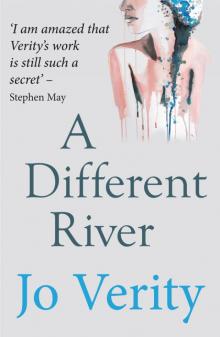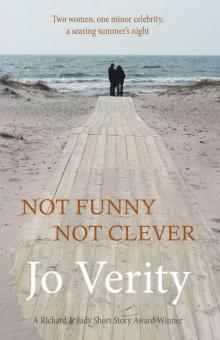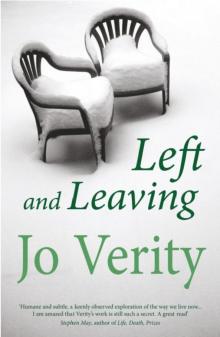Left and Leaving Read online
Page 3
Her father took four digestive biscuits from a tin on the worktop and placed them on a plate. ‘How’s that young man of yours? Mick, isn’t it? The journalist?’
‘It’s Nick, Dad. And he’s a literary agent, as you well know.’
His memory was perfect but he did this sort of thing all the time. It was as if he wanted to trivialise her life.
He waved a dismissive hand. ‘I can’t keep up with you.’
‘I’ve been seeing Nick for three years. What’s to keep up with?’ She shouldn’t rise to the bait but it was out before she could stop herself.
‘Seeing.’ He shook his head in mock despair.
They drank tea and nibbled the biscuit allocation. Whilst her father described a documentary on Wellington bombers that he’d watched the previous evening, her thoughts drifted to the difficulties that Friel Dravid was having in obtaining planning permission for a spa hotel near Dorchester.
After a while her father stopped talking and closed his eyes. She stared at the digital clock on the cooker, the burble of the gas and the plink of the tap as it dripped into the sink the only sounds to penetrate the congealing silence.
It seemed that each time she came they had less to talk about. The past – a natural source of conversation between fathers and daughters – would never be a comfortable country for them to revisit together. Yes, she had happy memories but, without exception, these involved her and her mother. What was the point in asking ‘Remember the time…?’ to someone who’d played no part in the story?
There was something she needed to talk to her father about and her opportunity came when, eyes still shut, suddenly he said, ‘Are these latest cuts affecting you?’
‘We’re okay. We’ve got enough to keep us going for a while.’ She cleared her throat. ‘Actually we’ve had some good news.’ (Not strictly true – the firm had learned of its success a couple of months ago.) ‘The firm’s won a competition. For a gallery in Cologne. Quite a prestigious job.’
He nodded. ‘Well done. I expect your German will come in useful.’
‘Yes. I’ve been over a couple of times. To look at the site and talk to the client.’
He turned to look at her. ‘You didn’t mention it.’
‘No. Well. We were up against stiff opposition. There wasn’t much point in getting our hopes up prematurely.’
‘So you’ll be traipsing back and forth I suppose. Or can everything be done on the internet these days?’
‘We can do a lot from London. But Howard’s talking about opening a small office over there. It would make sense to have someone on the spot.’
She waited while he processed the information.
‘You’d be the obvious choice,’ he said.
He was right. She spoke perfect German. She had no husband. No children. No commitments – except, of course, to him.
Vivian might as well be an only child. Richard – who was something to do with engineering – lived outside Edinburgh. John had just recently taken up a post at the University of Toronto. They both sent her Christmas cards. But so did her dentist. In fact she saw her dentist twice a year and the last time she’d seen her half-brothers was at her mother’s funeral. She still didn’t understand why they’d trekked down from Scotland for someone who was all but a stranger.
‘Yes,’ she said. ‘And it would strengthen my position should the firm need to slim down.’
Job security had nothing to do with it. She’d been heavily involved with the project from its inception and was eager to see it through. But job security was a reason he would understand.
‘You must do what you have to do,’ he said.
She tried not to notice his hands, the delta of veins visible through the papery skin. The razor nicks on his scraggy neck. Encased in his brown chair, he resembled a shrivelled kernel inside a nutshell.
‘I’ll be back every couple of weeks,’ she said. ‘And it’d be a temporary arrangement.’
‘A bit like me,’ he said and gave a mirthless laugh.
At six o’clock they shared a scant supper of jam sandwiches and out-of-date almond slices and, shortly after that, she escaped, her spirits lifting as the door banged shut behind her.
The rain had stopped and the wind was chasing skeins of cloud across the moon. It was much colder. She headed for the station, walking as quickly as she could, taking oversized breaths, the air scouring her throat. She fished her iPod from her bag and pushed the buds into her ears. Scrolling through her ‘favourites’, she chose The Weakerthans to accompany her home.
4
Gil’s flat consisted of a good-sized living-dining-bedroom and, opening directly off it, a miniscule kitchen and rudimentary bathroom. In summer it was stifling. In winter, when the temperature plummeted as it had last night, the bedding felt damp and his breath misted the air. The oil-filled heater made next to no difference except to send his electricity bill soaring. In theory, heat from the flats below should help to warm his, but any rising heat simply kept on rising, leaking out of the roof and into the skies above Kentish Town. Despite its shortcomings, there was something satisfying – romantic, even – in its simplicity. He suspected that the place contravened every safety regulation in the book but he wasn’t going to make waves and risk eviction.
Gil had spent his first months in London working in pubs and cafés. With luck and persistence, he’d eventually secured the job at the hospital and been able to afford a room in a house-share. His housemates were medical students and, after a few months, when pounding hip-hop and pubic hair (never his) embedded in his soap were getting too much, one of the hospital porters had put him on to this bedsit.
He’d arrived with a rucksack and a holdall and, for a while, he’d held out against acquiring ‘stuff’. This place came with a bed and a few bits of furniture but inevitably his belongings had multiplied. TV set, armchair, a dated (but superb) sound-system, an old Fender acoustic – all second-hand. A laptop and broadband connection – pricey but essential for keeping in touch with his children and his mother. Far too many books, CDs and DVDs. If anyone asked him to describe his home he’d put it somewhere between a teenager’s bedroom and a junk shop.
If truth were told, he was too old for this stripped-down life. Men of his age owned property; joined golf clubs; pottered in garden sheds and polished cars. If he’d toughed it out with Janey, if he’d stayed in Coffs Harbour, he could be doing just that. But they’d both accepted that the marriage was over. Janey was happily remarried to a bloke she’d been at school with, whilst Gil was doing what he might have done twenty years ago had he not impregnated Janey Burnet, the sexy young waitress who worked at the café down by the Marina.
After a week of dank, colourless days when the sluggish air had seemed to be depleted of oxygen, today was crisp and clear, the sky the mid-blue of the plumbagos that his mother grew outside her back door. In the street, vehicles parked nose to tail were frosted over and yesterday’s litter was edged with ice crystals transforming each discarded cigarette packet and bus ticket into glittering treasure. He guessed that the temperature was way below zero and, by the time he reached the bus stop, his nasal passages felt scalded by the freezing air.
Freddy Kimura – an orthopaedic surgeon whom Gil liked for his dry wit and penchant for modern jazz – asked whether he’d be able to stay late to photograph a procedure.
‘Sorry it’s last minute, Gil, but I wasn’t sure the patient would show.’
‘Something unusual?’
‘Only a laminectomy – but it’s a tricky one. It’ll make a great case study. He’s signed the consent form so no problem there. I’ve spoken with Kevin. He said you could take time in lieu.’
Gil had half-wondered whether he’d wander down to the South Bank this evening – Peeping Tom was showing at the BFI. But he wasn’t set on it.
‘You’re on,’ he said. ‘Kick-off time?’
‘Four-ish. I’ll ring you when we’re ready to start.’
Gil’s morning forays a
cross the road whetted his appetite for the outdoors and when Kevin thanked him for agreeing to stay late, he took the opportunity to ask for an extra half hour for lunch.
‘Sure. And thanks for doing Freddy’s thing. I’d have done it myself but…’ Kevin closed his eyes and yawned.
Baby Jack certainly had his father on the ropes.
Dropping his point-and-shoot in his pocket, Gil pulled on his old beanie and hurried out through the revolving door. It was still cold, frost lingering in the canyons between buildings where the winter sun failed to penetrate. He headed for Regents Park, a fifteen minute walk away.
This corner of the park, abutting Euston Road and opposite the Tube station, was always busy. On summer days, every bench was taken, the grass a sea of escapees from offices, and tourists taking a breather before pushing on to the Zoo or Madame Tussauds. Today certainly wasn’t sitting weather. People were on the move, striding out, shoulders hunched, hands deep in pockets.
Earlier in the year, Gil had identified a spot near the fountain that was good for people-watching. The tumbling water seemed irresistible and there was always a crowd around it. He made his way there and wasn’t disappointed. A group of teenagers – Russian or Polish – were fooling around, the boys threatening to toss a pink knitted cap into the fountain. Sneaking out his camera, he grabbed a shot of the hat sailing through the air above its owner’s up-stretched arm, and another as it hit the water.
Gil had set himself a project. ‘Headgear.’ It was the type of assignment given to photography students in their first semester but he was enjoying having something to go at. He had no idea what he would do with the pictures. He’d need permission from each of his subjects if he wished to exhibit them. He understood why. Even so it was a bitch.
But he today he wasn’t here to take photographs and, walking on a little further, he found a seat in the lee of a yew hedge which faced the sun. He took a sheet of paper from his inside pocket, noting how warm it was to his cold hand. He checked his watch. Ten minutes before he needed to start back.
His daughter’s email had been there this morning when he’d logged in to his Hotmail account. He’d scanned it quickly then printed it out, folding it away in his pocket, trying to put it out of his mind whilst he photographed leg ulcers and malignant moles.
The sun, although welcome, was having little effect on the temperature. Pulling his collar up around his ears, he slouched down into the warmth of his coat and read what Polly had written.
Hey Dad,
I was going to phone but we don’t seem to be very good at talking to each other these days, do we? It’s weird to think of you shivering while we’re on the beach. Thanks for the latest pics. Your flat looks pretty neat.
I have some BIG NEWS. I’m thrilled and I really, really, REALLY hope that you’ll feel the same way. I’m going to have a baby. You’re going to be a grandfather!!!! Mum was OTM when I told her and you’ve got to be too. Chris and Adam don’t know yet. I guess boys don’t get excited at being uncles, specially as she won’t be playing for Oz. Yes. It’s a…GIRL. Due in March. So I won’t be getting over there to see you in June like we planned.
I hope this changes things enough for you to want to come back. I don’t expect you to live in Coffs but I want my daughter’s grandfather to at least live on the same continent.
Another thing you should know – Gran isn’t so good. After your visit home she seemed to get smaller. And she forgets things. She’s started letting people do things for her, which is totally not her. She misses you, Dad, and she’s not going to live forever.
I haven’t mentioned a bloke. That’s because he was long gone before I even knew I was pregnant. I have no intention of telling you or anyone who he is. I’m doing this on my own so, if we’re to stay in touch you’d better accept it. There. Good job I didn’t phone.
Don’t bother getting back to me unless you have something nice to say.
P x
He folded the letter and returned it to his pocket, closing his eyes. This was crazy. Polly didn’t stick at anything for more than five minutes. Was she capable of being a mother? And what about money? How would she support herself? Where would she live? With Janey? Who, and where, was the bastard that left her in the lurch? Round and around it went, dredging up memories.
It was Janey’s day off and they’d arranged to meet for lunch. She’d been waiting for him when he came out of the Gazette office. He could picture her now. Shiny brown hair. White blouse. Pink shorts. When she’d told him that she was pregnant, his first thought had been to deny that it was his, the way a kid denies breaking the classroom window with a leg drive. It wasn’t me, miss. ‘Perhaps you’ve made a mistake,’ he’d blurted out and Janey had started sobbing. He’d wanted to run. And he might have done, had she not been clinging to him. Disbelief was followed by distaste and then suddenly – from out of the blue – pride. Wasn’t this was what his gender had evolved to do? Procreate? Polly had been born and her miraculous presence compensated for all the crap. For a while anyway. And when the scales were beginning to tip again, along came twin sons.
A young woman pushing a pram stopped near Gil’s seat, rocking the pram gently with one hand whilst talking on her mobile. By turning his head slightly, he was able to study her. She finished her call and perched on the end of the seat, keeping a safe distance between them. Rummaging in her bag, she took out a chocolate bar and a tangerine.
She might have been younger than Polly (it was hard to tell) and for all he knew she was the au pair. But something about the way she tucked the blanket around the sleeping baby, her absorbed expression and the exhaustion etched across her face, told him that she was the mother. She’d taken off her gloves to peel the fruit and he had a clear view of her left hand. No ring. This could be Polly in six months time.
The baby roused and gave a fretful whimper. The girl lifted it out, swaddling it in layers of blanket. She didn’t seem to notice that he was there as, muttering the nonsense that came naturally to women when they held a baby, she kissed the tiny forehead.
‘How old’s the baby?’ he asked.
He felt her give him a quick but incisive inspection before deciding that he wasn’t a threat. ‘She’ll be five weeks tomorrow.’
‘How are you doing?’
She smiled. ‘We’re doing fine, thanks.’
Gil stood up and for the first time he could see the tiny face, pink and cross and new. He’d felt indifference when Kevin had shown him the photo of Jack but now, looking at this scrappy little thing cradled in the girl’s arms, his eyes welled.
Reaching in his pocket for a tissue, he blew his nose violently. The noise made the child jump and turn her head towards him.
‘Sorry,’ he grimaced. ‘My wife used to get mad at anyone who woke the kids. Funny how you forget all that stuff.’
‘You’ve got children?’
‘Three. A daughter and twin sons. They’re grown up now.’
‘Grandchildren?’
‘No.’ He hesitated. ‘Actually – just this morning in fact – I heard that my daughter’s expecting in the spring.’
The girl smiled, temporarily banishing all signs of fatigue. ‘That’s wonderful. Congratulations. You must be thrilled.’
‘I’m still getting used to the idea.’
He felt the cold lump of his camera in his pocket and, for a second, thought of asking the girl if he could take a photograph of her and her baby. He sensed that this moment, here in Regents Park, might one day prove to be significant. No. He didn’t want to freak her out.
‘I’d best get back to work,’ he said. ‘Take care of yourselves.’
He hurried off, turning to look back only when he reached the park gate. But she had already gone.
5
The lecture was due to start at six-thirty. Vivian had decided that she couldn’t spare the time when Howard stuck his head round the door. ‘Ready?’
She shook her head and indicated the files heaped on her desk. ‘I real
ly ought to—’
‘It’ll still be there in the morning. Get a move on.’
‘You’re the boss.’
‘What’s on the menu tonight?’ he asked as they bundled into a cab.
‘“Globalisation and the Architect”. Ned Rasmussen.’
He sighed. ‘Oh dear.’
‘You always say that. I don’t know why you bother going.’
‘To see and be seen, like every other bugger there. And be under no illusion. Rasmussen’s in it for the same reason. Plus a juicy fee, of course.’
‘You’re horribly cynical,’ she said.
‘Well I doubt whether anyone positively wants to hear about globalisation and the architect.’
‘I do,’ she said. ‘Listen.’
She was clutching a pamphlet which she tilted towards the cab window, the street lights illuminating the paper. ‘“The rapidly expanding economies of the developing world are shaping new cities at unprecedented speed and scale. Western architectural practices have been popular choices for signature buildings and master-planning in both the Middle and Far East. Will the focus remain on imported approaches or will there be a shift to more local solutions?” That’s got to be right on the money.’
He patted her knee. ‘We may have won a minor competition, Vivian, but Friel Dravid isn’t a global player.’
‘We could be.’
‘No. We couldn’t. Nor would we want to. And I shan’t fret too much if Foster, Gherry and the like lose out to the locals. Therefore I suggest we sit back and enjoy the pretty slides.’
Howard was right. They should leave skyscrapers in the desert to the big boys. A small firm like Friel Dravid would be well advised to stick to what they did well and not overreach themselves. The German job was modest but it would enhance their reputation and pull in more work in Europe – unless the Euro-zone went down the pan.
The lecture was well-attended. Rasmussen was a good speaker, his thesis clear and well formulated. The slides were excellent. When she sneaked a glance at the audience, she suspected that several of them, including Howard, were dozing, soothed by his mellow voice.

 Bells
Bells A Different River
A Different River Sweets From Morocco
Sweets From Morocco Not Funny Not Clever
Not Funny Not Clever Left and Leaving
Left and Leaving Everything in the Garden
Everything in the Garden